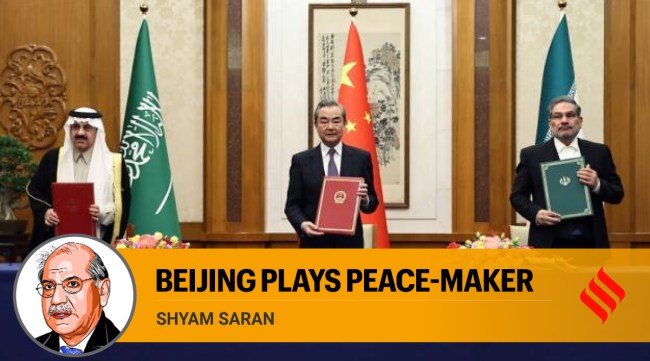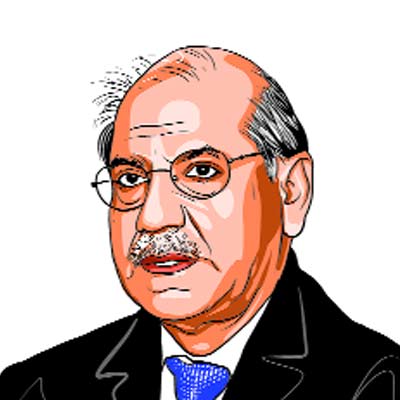Opinion Shyam Saran writes: With Saudi-Iran deal, China emerges as honest broker in a fractured West Asia
There is little doubt that while India has been successful in expanding its relations with all key actors in West Asia, it has ended up with diminished relations with Iran. It is not in its interest to see China entrench itself in a country that is strategically important, quite apart from being one with which we enjoy long-standing civilisational affinities
 Shyam Saran writes ,"China has leveraged its substantial economic, trade and lately, military relations with both Iran and Saudi Arabia to broker a deal and this cannot but enhance its diplomatic credibility and international posture." (Reuters)
Shyam Saran writes ,"China has leveraged its substantial economic, trade and lately, military relations with both Iran and Saudi Arabia to broker a deal and this cannot but enhance its diplomatic credibility and international posture." (Reuters) China’s parliament, the National People’s Congress (NPC) was in session in Beijing, when news broke on March 9 that China had successfully brokered a peace accord between Saudi Arabia and Iran, which have long been implacable adversaries in the region of West Asia. The optics were as important as the accord itself. The national security advisors (NSA) of Iran and Saudi Arabia had reached agreement in confidential talks held in Beijing, with Chinese State Councilor Wang Yi playing the role of mediator and facilitator. The picture released marking the occasion showed the two NSAs flanking a beaming Wang. This conjured up images of the Oslo Accord of 1993, when then US President Bill Clinton was similarly flanked by the Palestinian leader Yasser Arafat and Israeli Prime Minister Yitzhak Rabin after signing a peace deal.
That a long-standing ally of the US — Saudi Arabia — was accepting and acknowledging publicly the mediatory role of China, which is locked in a sharpening, all-round confrontation with the US, cannot be regarded as anything less than a major diplomatic setback for Washington. The New York Times noted: “This is among the topsiest and turviest of developments anyone could have imagined, a shift that led heads spinning in capitals around the globe.”
Saudi Arabia and Iran have agreed to revive two key agreements they concluded during an earlier phase of positive bilateral relations. One is a 1998 agreement on economic, trade and investment cooperation; the other is an agreement on internal security cooperation, concluded in 2001, which covered organised crime, terrorism and drug trafficking. The two countries also agreed to resume diplomatic relations and exchange of ambassadors. These relations were severed by Saudi Arabia in 1988 in the aftermath of violent incidents in Mecca by Iranian pilgrims. On the present occasion, too, there is agreement to reopen embassies and exchange ambassadors after a hiatus of seven years. Saudi Arabia broke off diplomatic relations in the wake of an attack and burning of its embassy in Tehran in 2016, which was a reaction to the execution of a Shia cleric by Saudi authorities.
The importance of the peace accord also lies in this bringing together of the leading Shia country, Iran, and the leading Sunni country, Saudi Arabia. This bridging of the sectarian fault line, however modest it may be at this stage, could have a major impact on regional equations.
In one sense, this development should not have come as a surprise. The US is no longer dependent on energy imports from the region. It has itself emerged as a significant exporter of both oil and gas. It remains engaged because its major allies are still dependent on energy supplies from the region. It has a stake in the security of Israel, which also serves as its key regional ally. The US has tried to ensure Israel’s security by encouraging a Sunni coalition based on a projected Iranian security threat. It has promoted the normalisation of relations between Israel and key West Asian countries. The Abraham Accords of September 2020 were a significant diplomatic achievement with the UAE, Bahrain and Israel announcing their intent to establish diplomatic and trade relations. Subsequently, Sudan and Morocco joined the Accord. It was anticipated that Saudi Arabia would eventually follow suit and this would ensure a benign periphery for Israel. These calculations have now been upended.
China has leveraged its substantial economic, trade and lately, military relations with both Iran and Saudi Arabia to broker a deal and this cannot but enhance its diplomatic credibility and international posture. Its attempt to outflank the US in West Asia may diminish American pressure and constrainment in the Indo-Pacific. The timing is also noteworthy. China’s support for Russia in the ongoing Ukraine war had put it on the defensive. This initiative gives some of the initiative back into its hands. It is reported that Chinese President Xi Jinping may soon be visiting Moscow and thereafter, engage the Ukrainian leader Volodymyr Zelenskyy in a virtual conversation. China has announced a 12-point peace plan, which may be anodyne but could serve as an opening gambit. Even if Xi does not succeed in brokering a peaceful conclusion to the war, he would have embellished his reputation as a peace-maker.
What will this mean for India? India has done well in recent years in forging much closer relations with key Gulf states like Saudi Arabia, the UAE and Oman. It has been able to do so even while forging a close strategic partnership with Israel. The Abraham Accords opened the door to the I2U2 initiative which, in July 2022, brought together India, Israel, the UAE and the US in a quadrilateral regional framework, akin to the Quadrilateral (Quad) in the Indo-Pacific. The I2U2 cannot disguise its anti-Iran orientation, though India may not subscribe to this. The Beijing accord, if one may call it that, casts doubt on the relevance and efficacy of the I2U2.
India has so far avoided commenting on the Iran-Saudi détente. It should welcome it and use it to seek a closer and enhanced relationship with Iran. There is little doubt that while India has been successful in expanding its relations with all key actors in West Asia, it has ended up with diminished relations with Iran. It is not in its interest to see China entrench itself in a country that is strategically important, quite apart from being one with which we enjoy long-standing civilisational affinities. China has reportedly concluded a 25-year security and economic partnership with Iran worth $400 billion. If this is indeed true then it will not be possible for India to match this. However, India must find ways to revive and expand its energy partnership with Iran and fast-track the implementation of the Chabahar port and the transport corridor that would link it to Central Asia.
India’s western flank is far too important to be accorded second place to the Indo-Pacific.
Saran is a former Foreign Secretary and a Honorary Fellow at CPR, Delhi






